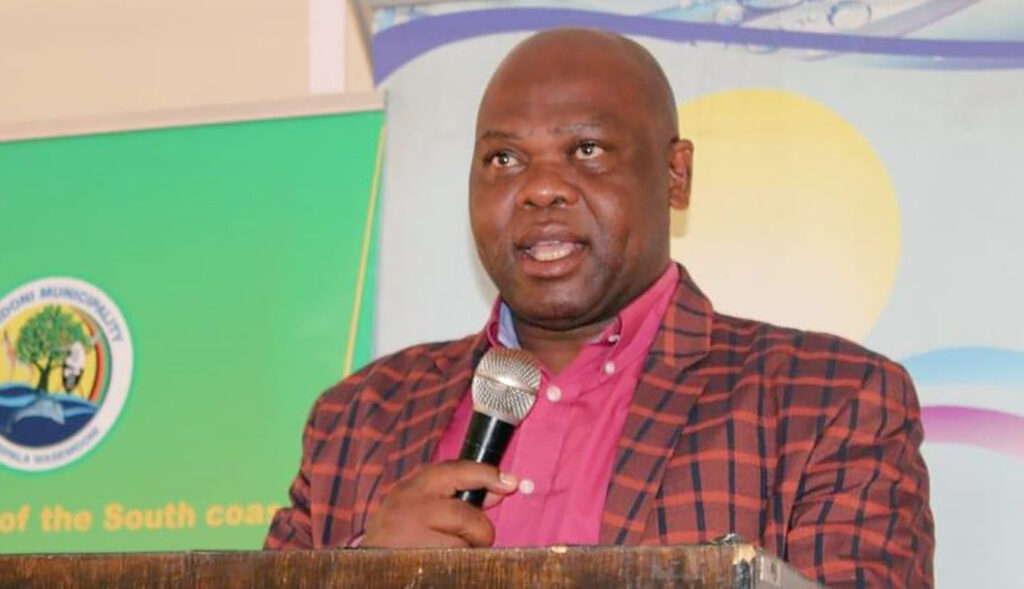Compounded chaos: Umdoni residents have been protesting for weeks about service delivery. (Delwyn Verasamy/M&G)
The ANC in KwaZulu-Natal has axed Umdoni mayor Thabani Dube and the municipality’s chief whip, Bonginkosi Mngadi, after it discovered that officials claimed “danger pay” for working during the country’s hard lockdown. This occurred under the duo’s watch and they had not been held accountable for their actions, until now.
The municipality is currently in the midst of a rates dispute with a residents’ group, which is refusing payment until adequate service delivery and infrastructure maintenance takes place.
The party’s provincial secretary, Mdumiseni Ntuli, told a press briefing on Tuesday that the decision was taken after an extended provincial executive committee (PEC) meeting, which ended on Monday.
The decision would ensure improved service delivery and “ensure cohesion within and among ANC councillors”, he said. Umdoni had been on the agenda of the party’s PEC “almost every three months since we were elected”, he added.
The problems at the municipality — a divided caucus and subsequently dire service-delivery shortfalls — were compounding, he said, and had not improved since 2018.
Earlier this month, the provincial department of co-operative governance and traditional told parliament’s standing committee on public accounts that although it was aware of investigations being conducted at the municipality concerning the possible theft of funds and various supply-chain-management issues, the municipality failed to inform the department who was conducting the investigation, who was implicated, and the time period being investigated.
Ntuli said that because of blatantly poor leadership at Umdoni, service delivery had regressed. Additionally, he said, “the level of competition among our councillors, and the lack of direction from the political head of the institution, who has a responsibility to provide strategic leadership, both to the council and the administration, has been a problem.”
 Mayor Thabani Dube has been axed for corruption that occurred on his watch.
Mayor Thabani Dube has been axed for corruption that occurred on his watch.
The “embodiment” of the problems could be found in chief whip Mngadi and mayor Dube, he said, who were not delivering on certain expectations attached to their offices.
An example of the leadership failures related to management claiming danger pay during the hard lockdown, “which we were very, very unhappy with”.
“They paid without it being regulated by a policy of the municipality, let alone a decision of the council. So, we said to the leadership there: How did this happen under your watch? And when we raised our concerns, those who had received the danger pay started paying back the money, which means they knew from the time they were doing the thing that it was absolutely wrong, it was illegal, [and] it should not have happened.”
When provincial ANC leaders told the council that action had to be taken on the matter and evidence was provided that wrongdoing had indeed taken place, nothing substantive was done, he said.
“Their explanations were not convincing. And that is when we said [that] if you can’t supervise your subordinates, [the PEC] has a responsibility to supervise you. And when you are not able to act in accordance with the law and the mandate of your own organisation against clear wrongdoing in the municipality, we then have to act on you.”
He said officials at the municipality were “violating the law with impunity” because no one was willing to hold them accountable.
In 2019, the auditor general flagged price-gouging in several multimillion-rand contracts at Umdoni. The auditor general recommended disciplinary action be taken against a clutch of senior officials, including the former municipal manager, Xolani Luthuli.
The level of chaos within the municipality has been compounded by the Covid-19 lockdown having a detrimental effect on the region’s usually year-round tourism industry, with a group of property owners now refusing to pay their property rates.
As of 25 May 2020, residents from across the municipality began withholding their rates in a formal dispute, as permitted by the Municipal Systems Act.
Residents in Scottburgh, Pennington, Park Rynie, and from Sezela to Mtwalume and Umzinto created the Umdoni Action Group and officially lodged disputes with the municipality while embarking on a rates diversion/retention initiative, commonly referred to as a “rates revolt”.
The group stated in its dispute that “year after year” the municipality had failed in its “legislated duty to provide adequate services and to maintain municipal infrastructure”.
According to the treasury data, Umdoni’s allocation towards repairs and maintenance as a percentage of the value of its property, plant and equipment, was a paltry 1.7% in 2019, 5.1% in 2018, 3.1% in 2017 and 1.8% in 2016.
The norm, as set by the treasury, is 8%.